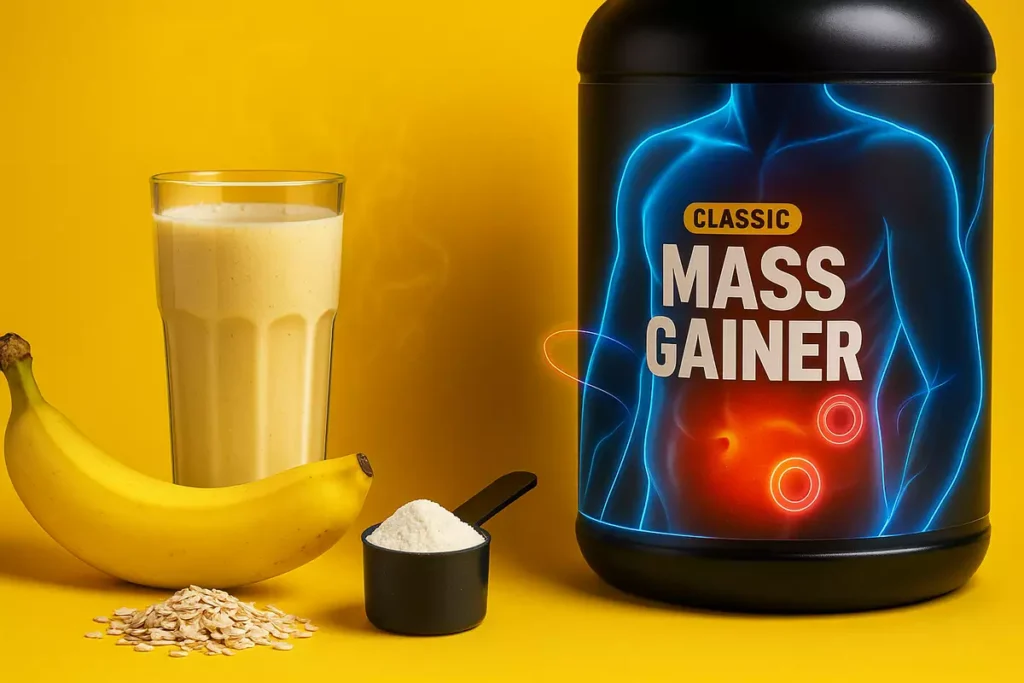Struggling with bloating after your mass gainer shake? You’re not alone.
While these high-calorie supplements are designed to help you bulk up fast, they can leave your stomach feeling heavy, gassy, and uncomfortable.
The truth is, not all mass gainers are gut-friendly—and choosing the wrong one can slow your progress and mess with your digestion.
In this article, you’ll learn exactly why some mass gainers cause bloating, how to avoid the common pitfalls, and what you can do to build size without sacrificing comfort.
Let’s fix your bulk—without the bloat.
Table of contents
Quick Answer — Yes, But It Depends on the Ingredients
Let’s be honest—mass gainers can be a blessing when you’re trying to pack on size. But yes, they can cause bloating and digestive discomfort, especially if you’re not careful with the ingredients or the way you consume them.
From my own experience and working with clients over the years, I’ve seen that bloating usually happens when people go for high-calorie shakes loaded with cheap carbs and poor-quality protein.
The good news? You can absolutely gain clean size without turning your stomach upside down. You just need to choose the right product, time it well, and adjust the serving size for your body’s needs.
If you’re unsure which route is better for bulking—whey protein or a mass gainer—check out this complete whey vs. mass gainer guide before you commit.
Why Mass Gainers May Cause Bloating or Digestive Issues

Bloating isn’t just bad luck—it usually comes from how mass gainers are formulated.
Many commercial products are packed with over 1,000 calories per serving. When you gulp that down in one go, your digestive system freaks out.
Here’s what typically causes issues:
- Carb Overload: Most mass gainers rely heavily on maltodextrin or dextrose—fast-digesting carbs that spike insulin and irritate your gut.
- Lactose Trouble: If your gainer contains a lot of whey concentrate, and you’re even slightly lactose-sensitive, gas and bloating are almost guaranteed.
- Low-Quality Protein: Some brands use fillers or subpar protein blends that your body struggles to break down.
- Too Much Too Fast: Your gut isn’t designed to handle a heavy liquid meal in one shot.
I personally remember trying a 1,200 kcal gainer that left me feeling like I had a bowling ball in my belly. Gas, pressure, and fatigue hit every time I drank it.
If you’re looking for better timing strategies to help minimize bloating, you might want to read the best time to take mass gainer for optimal digestion and energy.
Most Problematic Ingredients to Watch For
If you’re dealing with bloating, don’t just blame your body—check the label. Here are the most common offenders:
- Maltodextrin listed as one of the first ingredients
- Whey concentrate without any isolate or hydrolyzed whey
- Artificial sweeteners like sucralose or acesulfame-K
- Gums and thickeners that make shakes creamy but hard to digest
One of my clients, Samira, had severe bloating after using a gainer packed with artificial sweeteners. We switched her to a simple homemade version, added probiotics, and she felt lighter and more energetic in under two weeks.
Some people also do better with whole-food bulking. If you’re curious about that, this mass gainer vs. whole food comparison gives you a great side-by-side breakdown.
Real-World Tips to Avoid Bloating

After years of trial and error, here’s what’s worked best for me and my clients:
- Split the Serving: Don’t down 1,000+ calories in one shake. Instead, divide it into two servings—post-workout and pre-bed.
- Mind the Mixer: Use water or lactose-free milk instead of full-fat milk. It’s lighter and easier on the stomach.
- Let It Rest: After shaking, let it sit for a minute. It helps remove trapped air bubbles, which reduce gas.
- Separate from Big Meals: Take your gainer as a standalone snack or between meals—not alongside a full plate of food.
- Hydrate: Stay consistent with water intake throughout the day. It helps your digestive enzymes work more efficiently.
One client, Diego, used to drink two heavy shakes daily and always felt bloated. We cut the servings in half and cleaned up the ingredients—and just like that, the discomfort vanished.
If you’re someone trying to squeeze in calories late in the evening, here’s a helpful guide on using mass gainers at night without disturbing digestion or sleep quality.
Are There Digestive-Friendly Mass Gainers?
Yes, and they’re worth finding.
Look for these when choosing your product:
- Whey isolate or hydrolyzed whey instead of concentrate
- Carbs from oats or whole food powders, not just sugars
- Natural or no sweeteners
- Simple, transparent labels—no mystery blends
Personally, I had great results with a product from Optimum Nutrition. It used oat powder and whey isolate, and I could feel the difference—no bloat, steady energy, and easier digestion.
Better yet, you can make your own. My favorite homemade blend includes:
- Oats
- Banana
- Peanut butter
- Greek yogurt
- Whey isolate
- Almond milk
It’s balanced, budget-friendly, and most importantly—gut-friendly.
To dive deeper into ingredient quality and absorption tips, check out this guide on how to maximize mass gainer absorption.
Final Thoughts — Gaining Mass Without Gut Issues

Mass gainers are a powerful tool—but only if you use them the right way.
Start slow. Choose quality over quantity. And most importantly, listen to your body.
If you’re getting bloated or tired after every shake, something needs to change. Clean bulking should feel strong, not sluggish.
Many of my clients eventually realize that the right shake at the right time makes a massive difference. If you’re debating between a gainer and protein shake combo, this mass gainer vs protein shake comparison can help you decide what fits your body better.
And if you’re a serious athlete looking for high-calorie performance, don’t miss our mass gainer guide for athletes.
The takeaway? Your gains don’t have to come with a bloated belly.
Choose smarter, train harder, and bulk clean.



Leave a Reply